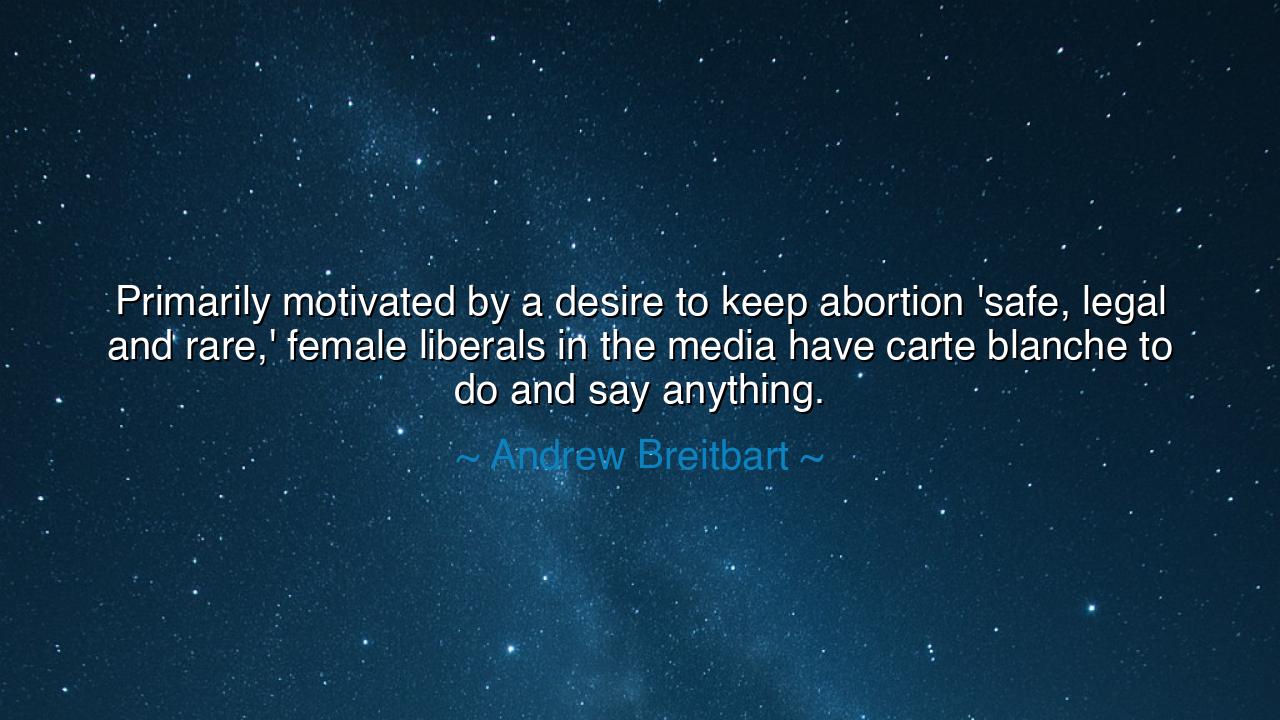
Primarily motivated by a desire to keep abortion 'safe, legal and
Primarily motivated by a desire to keep abortion 'safe, legal and rare,' female liberals in the media have carte blanche to do and say anything.






The words of Andrew Breitbart, “Primarily motivated by a desire to keep abortion ‘safe, legal, and rare,’ female liberals in the media have carte blanche to do and say anything,” burn with the fire of accusation and the anguish of cultural division. They are not gentle words, but words forged in the furnace of conflict — a declaration born from Breitbart’s vision of a world where media power shapes morality and defines what voices are heard or silenced. His statement is both a critique and a warning: that when ideology disguises itself as compassion, when moral certainty becomes a weapon, even noble causes can become veils for dominance. In his eyes, the phrase “safe, legal, and rare” — once a call for moderation — had become a shield behind which the powerful justified excess, a slogan that hid the machinery of persuasion beneath the language of virtue.
The origin of this quote lies in the sharp ideological battles of the early 21st century, when Andrew Breitbart, a conservative commentator and media provocateur, stood as a fierce critic of what he saw as the monopolization of cultural authority by liberal institutions. The debate over abortion, long the battlefield of America’s moral conscience, had become for him the symbol of a deeper struggle — the contest between truth and narrative, between the preservation of life and the redefinition of values. Breitbart, a man of the digital age yet steeped in the spirit of old political revolutions, believed that power over media and storytelling was the truest form of rule. In that arena, he saw a double standard: that those who spoke in the name of progress could transgress boundaries without consequence, while their opponents were condemned merely for dissent.
To understand his lament, one must look beyond the surface of his critique and see the ancient pattern it reveals — the pattern of those who wield moral authority to justify their dominance. In every age, from the priests of Thebes to the philosophers of Athens, there have been those who claimed virtue as their armor and reason as their weapon. They declared themselves the guardians of truth, yet in doing so, often silenced others. So too, Breitbart perceived in the modern media landscape a new priesthood — not of temples, but of television and ink — who claimed enlightenment but wielded it selectively. His accusation is not merely political, but philosophical: that power, when clothed in righteousness, becomes most dangerous of all.
Consider the story of Socrates, who stood before the Athenian court accused of corrupting the youth and questioning the gods. His accusers, like the media voices Breitbart condemned, believed themselves defenders of virtue. Yet their fear of his dissent led them to silence him. In their zeal to protect morality, they destroyed a man whose only crime was to question. The same peril haunts every age — the peril of righteous arrogance, when those who claim to speak for justice allow no room for doubt. Breitbart’s warning, then, is not only about abortion or media bias, but about the ancient tension between moral conviction and intellectual humility.
In his fiery way, Breitbart sought to expose what he saw as hypocrisy: that those preaching tolerance sometimes practice exclusion, and those who invoke compassion sometimes wield it as a weapon. To him, the phrase “safe, legal, and rare” had lost its sincerity, becoming a ritual phrase, repeated to sanctify what society no longer wished to question. He saw in it not compassion for life, but comfort for conscience — a way to appear humane while avoiding the deeper moral reckoning that the subject demanded. Whether one agrees or disagrees with him, his words force reflection: how often do we, too, use language to soothe our discomfort, to disguise the tension between what is convenient and what is true?
Yet, amid the fire of his rhetoric lies a truth that transcends ideology — the call to accountability. Power, no matter who holds it, must never go unchallenged. The wise must always question those who speak from authority, even when their words seem noble. Every society must look inward and ask: Are we honest about our motives? Do we allow debate, or do we silence it in the name of virtue? For when public discourse becomes dominated by one moral perspective, when the press or the pulpit claims a monopoly on righteousness, truth itself becomes a casualty.
Let this be the lesson drawn from Andrew Breitbart’s bold and unsettling words: beware the comfort of moral certainty. Seek truth not in the shouts of ideology, but in the quiet labor of discernment. Listen not only to those who agree, but to those who challenge. The health of any democracy — indeed, of any civilization — depends not on the victory of one side, but on the perpetual questioning that keeps power honest. And whether one stands with Breitbart or against him, his warning remains eternal: that freedom dies not only when tyrants rise, but when the people surrender their judgment to the idols of moral fashion. In every age, let there be those brave enough to ask — not what is permitted, but what is right.






AAdministratorAdministrator
Welcome, honored guests. Please leave a comment, we will respond soon